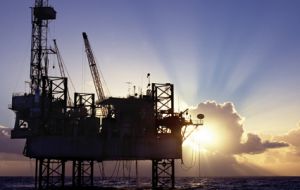MercoPress. South Atlantic News Agency
Argentina/Brazil to jointly explore for South Atlantic oil
 Enarsa and Petrobras will join effors in the South atlatic
Enarsa and Petrobras will join effors in the South atlatic Brazil's Petrobras and Argentina' energy company, Enarsa will cooperate in offshore hydrocarbons exploration in the South Atlantic was announced Monday in Brasilia following the meeting in Brasilia of President Lula da Silva with visiting elected president Cristina Kirchner.
Brazilian sources at Planalto published in the Brazilian press indicate that energy, including nuclear, was one of the main points of the agenda addressed by the two leaders with Petrobras willing to share its deep sea water expertise in the South Atlantic. "President Lula da Silva insisted very much in deep sea exploration in the South Atlantic", said the presidential advisor Marco Aurelio Garcia. Petrobras recently announced the discovery of giant oil field off shore at a depth of 7.000 meters, which extends along the Brazilian coast from south of Rio do Janeiro to Santa Catarina in southern Brazil. Petrobras which has a growing presence in Argentina is scheduled to announce next week significant investments in a thermal generating plant in Ezeiza which is to be converted to a combined cycle, increasing production from 679 MW to 970 MW in 2010. The significance of Brazil's commitment was heightened by the fact a top manager from Petrobras was the only official out of government that participated in the bilateral ministerial meeting in Brasilia and was also one of the main speakers. Argentina and Brazil also ratified energy complementation agreements, based on available pools, plus the construction of a bi-national hydroelectric plant up River Uruguay. The Garabí dam project will demand a 1.8 billion US dollars investment and construction is scheduled to begin in 2008. Nuclear cooperation was high in the bilateral agenda. "We want to increase nuclear cooperation for peaceful means; Brazil needs more cooperation in space, defense and nuclear issues" stressed Marco Aurelio García. "The agenda for the bilateral commission involves energy, defense industry development and particularly nuclear energy", added Lula da Silva's advisor. Both Argentina and Brazil for several decades now have electricity generating nuclear plants which supply their national grids. Brazil's Navy is also known to be working on developing a nuclear sub and both countries have several institutions dedicated to nuclear research. There's an ongoing debate in Brazil as to the country's commitment to nuclear energy, research and development. Some think tanks believe that since the country is among the world's ten leading economies and is a major player in global affairs, it should also become a first line power in nuclear affairs.




Top Comments
Disclaimer & comment rulesCommenting for this story is now closed.
If you have a Facebook account, become a fan and comment on our Facebook Page!